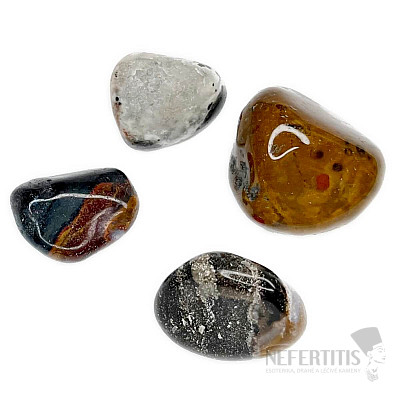Sardonyx tumbled stone
Sardonyx tumbled stone
Tumbled sardonyx. Sardonyx is considered a stone of strength and protection. As an amulet, it is said to bring happiness and stability to partnerships or marriage, and gives joy. Sardonyx is also worn as a talisman to… more »
Buy and get shipping for 5.20 €
view shipping options
| Parcel service DE | 6 € | |
| Parcel service LT | 7.40 € | |
| Parcel service LU | 6.60 € | |
| Parcel service LV | 7.40 € | |
| Parcel service NL | 6.60 € | |
| Parcel service PL | 5.20 € | |
| Parcel service PT | 11.20 € | |
| Parcel service RO | 7.40 € | |
| Parcel service SE | 10.60 € | |
| Parcel service SI | 7.40 € | |
| Parcel service IT | 10.60 € | |
| Parcel service IE | 12.70 € | |
| Parcel service AT | 6 € | |
| Parcel service BE | 6.60 € | |
| Parcel service BG | 10.60 € | |
| Parcel service EE | 7.50 € | |
| Parcel service ES | 11.20 € | |
| Parcel service FI | 12.70 € | |
| Parcel service FR | 10.60 € | |
| Parcel service HR | 6.60 € | |
| Parcel service HU | 6 € | |
| Parcel service DK | 6.60 € |
Sardonyx tumbled stone
Tumbled sardonyx. Sardonyx is considered a stone of strength and protection. As an amulet, it is said to bring happiness and stability to partnerships or marriage, and gives joy. Sardonyx is also worn as a talisman to give courage and fearlessness. It is said to be a stone that helps end family disputes and attracts good fortune and luck. It is also said to strengthen will and character. According to folk traditions, it increases psychological resilience, helps with states of depression. It is traditionally a stone that establishes peace and joy. It is often said to help with honest behavior and provides the ability to speak and communicate. It encourages the search for the meaning of life. Illustrative image.
The name of the mineral is derived from the now extinct city of Sardis, Old Persian Sparda, which was located in western Asia Minor, in present-day Turkey. The reddish-brown or orange-brown part of sardonyx is referred to as Sard, the black and white part is onyx.
The description of the alleged properties of the stone, which do not relate to its chemical and physical properties, is based on generally disseminated and generally available information about the traditional folk use of the stone, which is not scientifically verified, and therefore does not constitute a proposal to conclude a purchase contract pursuant to Act 89/2012 Coll.




